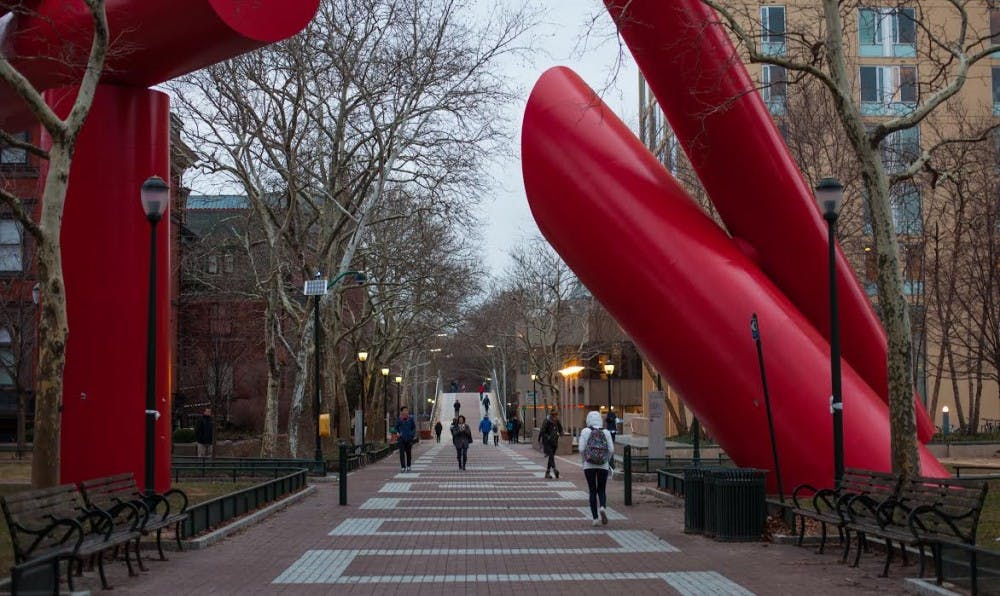“Here we are on College Green,” our guide exclaimed in a sing–songy voice. “There’s always tons of events and activities happening here—everyone always comes together and hangs out on College Green.”
Around us, students were rushing to class in 40–degree slush. Faces blank, earbuds in, hoods up, heads down. College Green was empty except for a probable freshman cutting across to get to College Hall, and another tour group staring reverently at the bronze Ben Franklin.
A little while earlier, seven high school students flanked by parental entourages (and me, sans entourage, in a borrowed high school hoodie) had been herded out of Cohen Hall into the bright afternoon sunlight to get our first glimpse of the University of Pennsylvania. Our tour guide, a posh and peppy Wharton sophomore, was determined to show us the very best of what Penn has to offer.
Kite and Key tour guides are on the front lines of the University’s marketing campaign, showing thousands of visitors every year that Penn is the place to be. With 2,445 newly–minted Quakers wondering what life at Penn is really like, now is an important time to consider the truth content in our school’s sales pitch. While many Penn students may have mixed feelings about the University, the Kite and Key guides have made it their job to convince prospectives otherwise. But making Penn look good can conflict with an honest representation of the school’s problems with academic policies, campus culture, and mental health.
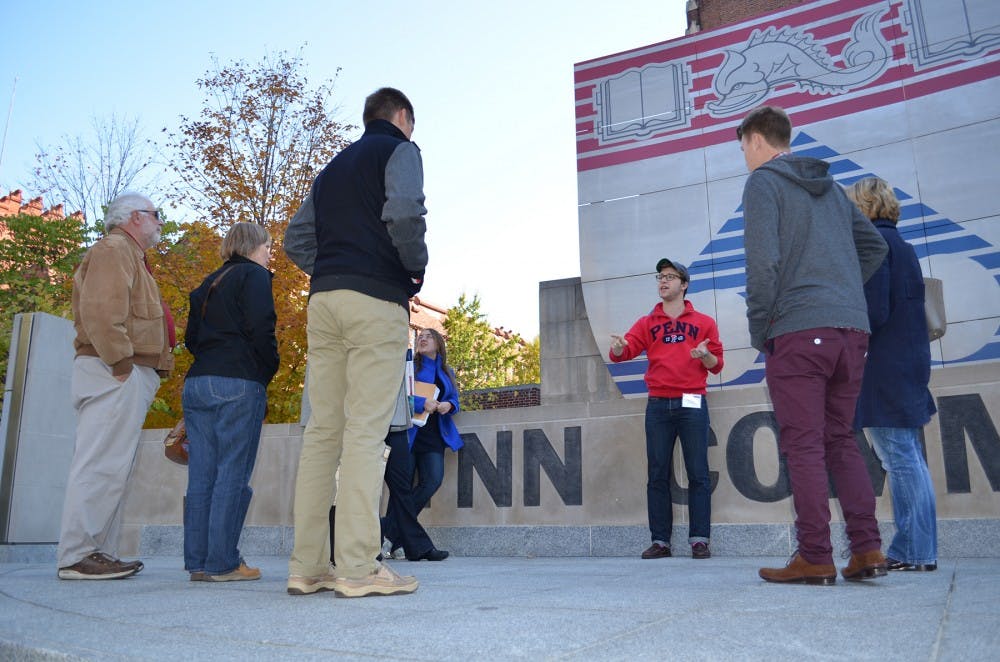
On this particular tour, our guide told us how “we all” go to the football games, about homecoming, toast–throwing, the engineer who built a toast zamboni. Topics which, while charming, seem largely irrelevant to the day–to–day life of the typical Penn student. I knew I couldn’t blame this specific guide, since all Kite and Key members are trained to give the same tour.
As we approached Van Pelt, one prospective student asked our guide if she had applied Early or Regular decision. She had, in fact, been deferred and then waitlisted by her top choice school. In the meantime, she was accepted to Penn. She pitched it as the best thing that had ever happened to her.
At that first stop on the steps of Penn Commons, our guide told us all about the College’s sector requirements. They’re not really any extra work, she emphasized, and you can always find sector classes relevant to your interests. According to data from Penn Course Review and interviews by the Daily Pennsylvanian, many Penn students and professors strongly disagree.
Courses that fulfill Physical World and Natural Sciences and Mathematics sectors, for example, were respectively rated 0.4 and 0.8 points below the College average on Penn Course Review’s 4.0 scale.
She had only good things to say about the Critical Writing Seminar. “It helps you get your writing from high school– to college–level right when you enter Penn. There are so many options, so you’re bound to find a class that you like.” Even better, “you get really close with the people in your writing seminar.” She let slip that she was putting it off until senior year.
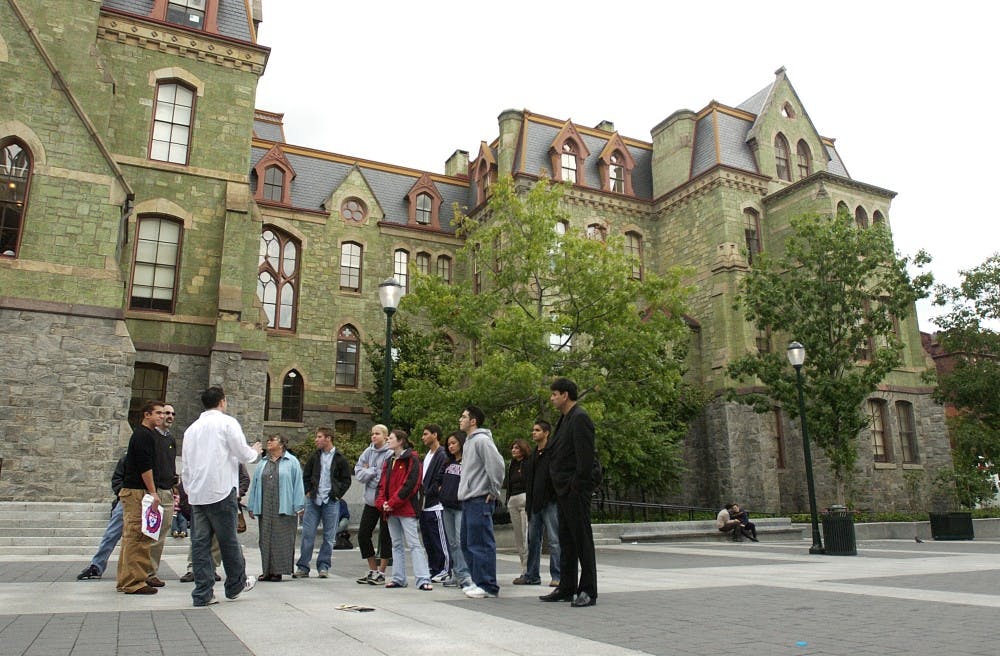
On study abroad: “Penn wants you to study abroad. They’ll make it happen, no matter what school you’re in.” But according to 2015 Penn Abroad data, only 7% of engineers and 5% of nursing students were able to study abroad due to cramped academic requirements.
While we strolled toward the Engineering Quad, someone asked about the difference between on– and off–campus housing.
“The reason people move off campus is just because the maximum number of people you can live with on campus is four, and you can live with more people off campus,” she said.
But Penn students have cited the cheaper alternatives and limited freedom as the main reasons for getting off campus quickly.
Alison Thompson (C ’18), calculated that she “could save a couple thousand dollars a year” by living in a house on 39th and Pine Streets. “It was an easy tradeoff.”
Noah Lobell (C’20) wanted to be a tour guide since high school, and joined Kite and Key soon after arriving on campus freshman year. “Every tour guide is ‘selling it’ to an extent,” he said. For example, “I didn’t really like the food in the dining halls. It’s all about painting bad things in a good light.”
But he doesn’t think it’s all about ‘selling.’ “Each semester, I get progressively more honest. As people go longer in Kite and Key, they see Penn more for what it is.”
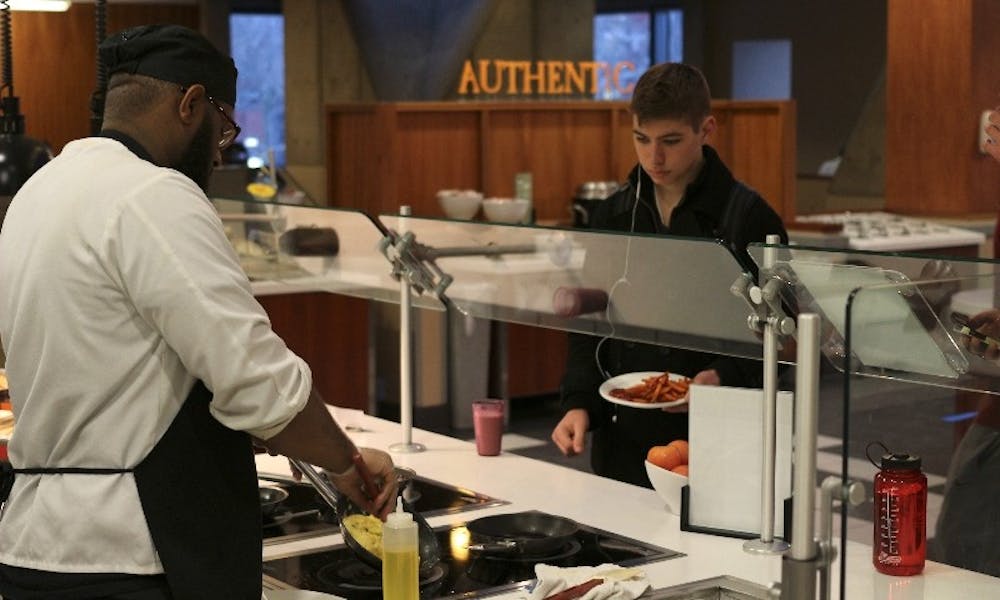
He does his best to portray life at Penn as happy and balanced. Especially since changing his major from Biological Basis of Behavior to Urban Studies, Noah is honestly happy with his Penn experience—so much so that he draws a blank when prospective students ask him “What’s your least favorite part of Penn?”
I posed that same question to the Kite and Key panelists leading an information session, which was held as an alternative to a campus tour. After an uncomfortable pause, one guide piped up.
“The worst part of Penn is honestly how many, like, opportunities there are. It sounds cheesy but it’s literally true. Like, for me, do I want to be pre–med? Or just finance?”
Perhaps she was telling the truth, and this really is the worst part of Penn for her. After all, Noah remarked, “Kite and Key looks for the happy people.”
Ryan Leone (CW ‘19), the current President Emeritus of Kite and Key, agreed. People who are “genuinely happy with their life here” he said, make the strongest applicants.
“A good amount of self–selection goes into who applies in the first place,” Ryan said. “There are plenty of people on campus who, the last thing they’d want is to be a tour guide.” To those people, he would admit that, “Once [prospectives] get here, of course it’s not going to meet expectations, and it will be disappointing in some ways. We’re not trying to brainwash people … but we are trying to put Penn in the best possible light.”
Our guide moved on to “ways to get involved in Philadelphia,” but didn’t mention the Netter Center or Civic House. She named only one: Restaurant Week.

Next, a spiel on academic resources. “Every class has a free tutor.” I blinked. The only courses guaranteed to have open tutoring available through the Tutoring Center are intro–level STEM and business classes, and even those fill up almost immediately. Tutoring Center Director Donna Brown has told the Daily Pennsylvanian, “We don’t have a tutor for every course.”
When I tuned back in, the topic was faculty. “All professors are accessible and want to help you. If you want to get involved in research, literally just reach out to any professor. They will find you a spot in their lab.” She gave an anecdote about a friend who was handed a research position without even asking.
Alexis Gutierrez (C ’18) had a different experience getting started in research. “I started filling out applications at the end of August when work study jobs were being posted … of around 15 applications I got a response from three.” Of those, two turned her away before she finally got a lab position. She’s found this experience to be common among her peers in STEM.
Our guide moved on to mental health resources. “We know coming to a new school can be stressful, so it’s one of our priorities that everyone is happy and healthy.” She listed some mental health student groups, and mentioned that CAPS is great about seeing students who are “a little stressed” right away. But students have often complained of long wait times before they’re seen by a CAPS clinician, and many struggle with more than just “a little stress.”
Ethan T. (C ’18) describes one CAPS encounter as a “nightmare”: distressed enough that he was about to drop out of Penn, Ethan called CAPS’ weekend emergency line.
“Well, are you about to hurt yourself?” He remembers them asking.
He told them no, but that he really needed help.
“You’ll have to wait and call us during the week."

“When someone asks about mental health, even in the wake of a student suicide, I just talk about Penn’s mental health resources instead of specific events or challenges,” Noah said. “I don’t want to lie and paint Penn as an idyllic place where everyone’s happy—but, most people aren’t committing suicide.”
As 14 Penn students have died by suicide since 2013, mental health can be a difficult issue for tour guides to address. Reagan Bracknell (C ’21), a member of Kite and Key since her first semester, takes the same approach when asked about the state of mental health at Penn. “Though the actual suicide has a negative effect, it almost makes me look at Penn in a better light, because of how they respond to it.”
According to Ryan, Kite and Key leadership works closely with the admissions office to decide how to address sensitive issues. He hopes that guides are “upfront” about mental health, but encourages Noah’s and Reagan’s approach “so guides don’t have to give opinions; they can just give facts about university resources.”
“Everyone gets involved in so many clubs and activities. Our clubs are so social. It’s, literally, insane.” Suddenly she became more excited than she had been on the entire tour. “We also have lineages!” She talked enthusiastically about her bigs and littles in her consulting club and sorority until voices came behind our group.
Two guys, clad in Patagonia sweatshirts and backwards baseball caps, had come to embarrass our guide.
“Hey! Hey! HAPPY BIRTHDAY!”
“It’s not my birthday,” she assured us.
They yelled the birthday song loudly and out of tune, and swaggered out of sight.

At the Quad, we joined four other groups atop McClelland to hear about freshman housing. I decided to test the waters.
“Are there any cockroaches in the dorms?”
She laughed nervously. “I’ve only seen one bug in my time here—you can always call maintenance and they always come like immediately. They’ll come kill the bug for you if you happen to see one.”
With a record–smashing number of high school students vying to attend Penn—and top colleges vying to attract these applicants—Kite and Key guides show off the shiniest sides of Penn. But the convincing power of our sales pitch can’t come at the cost of honesty.
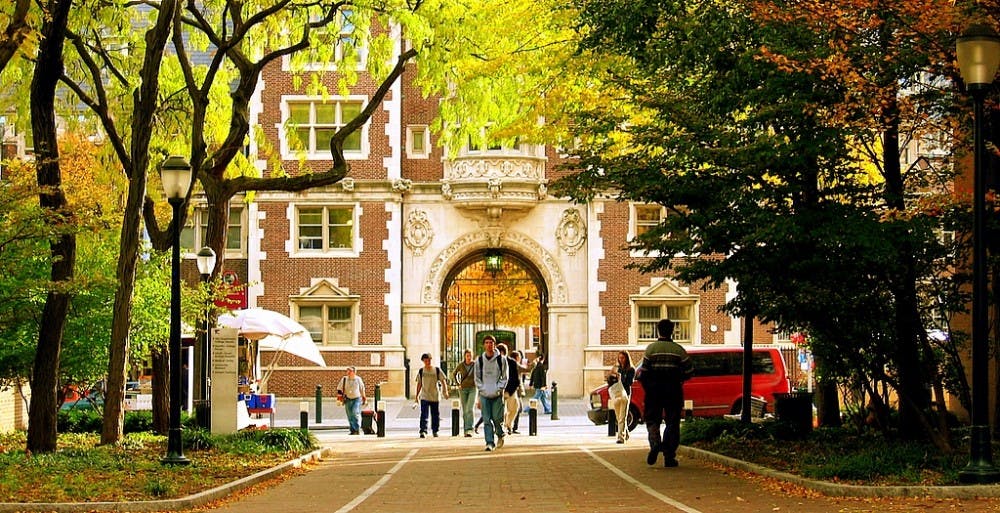
As we left the Upper Quad Gate, I wormed my way to the front of the group. I put on my shy–high–school–kid voice and asked how people’s mental health is at Penn. Is everyone really stressed out? Are people mostly happy here?
“We have so many mental health resources,” she repeated, but this wasn’t what I had asked.
I pushed again.
“We are an academically rigorous university, so of course once in a while it can get a little bit stressful—like any school,” she equivocated. “But yeah, I think everyone’s happy here,” she laughed. “I don’t know.”
Sharon Christner is a junior from Lititz, Pennsylvania studying English. She is a Features staff writer.
